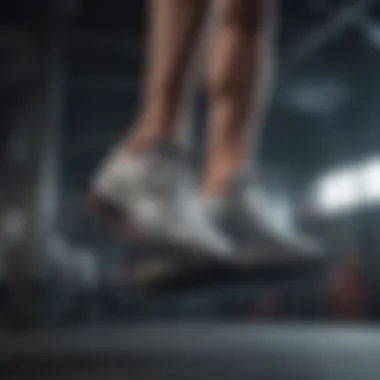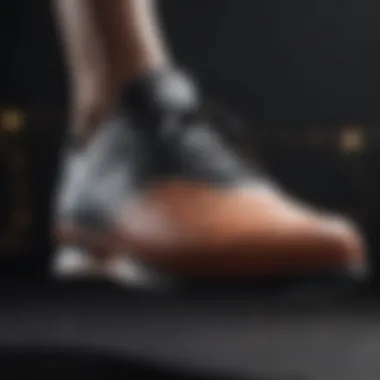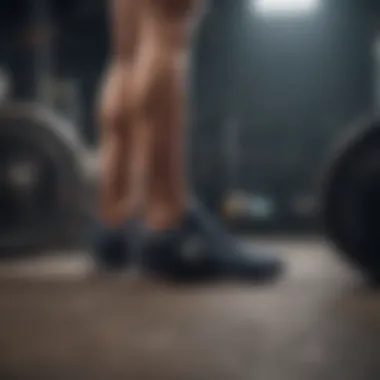The Comprehensive Guide to Reebok Legacy Weightlifting Shoes


Intro
In the increasingly diverse world of fitness footwear, weightlifting shoes are often overlooked. They serve a crucial purpose, enhancing stability and performance during training. Among the plethora of options available, Reebok has carved a niche with its Legacy weightlifting shoes. These shoes are designed for serious lifters, providing features that cater specifically to lifting mechanics. This guide aims to dissect the Reebok Legacy shoes, examining their engineering, performance, and overall impact on various lifting disciplines.
The Reebok Legacy weightlifting shoes stand out in a crowded market due to their unique design and construction. Understanding these shoes is essential for athletes and fitness enthusiasts alike, as their choice of footwear can significantly affect their lifting capabilities.
Key Points
- Detailed analysis of design and performance.
- Evaluation of suitability for different lifting styles.
- User experiences and feedback.
Through this comprehensive guide, readers will gain enhanced insight into how the Reebok Legacy shoes can optimize their weightlifting experience.
Overview of Reebok Legacy Weightlifting Shoes
The field of weightlifting requires specific equipment designed to enhance performance. The Reebok Legacy weightlifting shoes stand out in this domain, offering unique advantages that can significantly affect lifting outcomes. Understanding the features, history, and user experiences with these shoes aids in making an informed purchase decision and enhances the overall lifting experience.
Preface to the Reebok Legacy Line
Reebok has established itself as a prominent brand in fitness footwear, particularly with the launch of the Legacy line. This collection is engineered for serious weightlifters, emphasizing both functionality and style. The Reebok Legacy shoes aim to provide optimal support during lifting activities. Their design incorporates a raised heel, essential for improving squat depth and reducing stress on joints.
The shoes’ overall construction centers on performance needs. With a focus on stability, traction, and comfort, this line serves both experienced lifters and newcomers. By reinforcing specific areas of the foot, the Legacy shoes help distribute weight evenly, which minimizes slip and increases power transfer.
Historical Context of Weightlifting Footwear
The development of weightlifting shoes has evolved alongside the sport itself. Initially, lifters utilized regular trainers or even sports shoes for their workouts. However, as the demand for specialized footwear grew, brands started designing shoes that catered specifically to the needs of weightlifting. In the 1960s, the first dedicated lifting shoes emerged, featuring firmer soles and elevated heels.
Over the decades, innovations have led to improvements in materials and construction techniques. The introduction of synthetic uppers and rubber soles means that shoes can be lighter and more durable. All these changes reflect a better understanding of biomechanics, which enhances performance and reduces the risk of injury. The Reebok Legacy line builds on this rich history, incorporating lessons learned from decades of weightlifting footwear development.
In recognizing the legacy of weightlifting shoes, one must appreciate how they ultimately contribute to achieving personal bests in lifts.
"Specialized footwear can redefine how lifters engage with their sport, making the right choice crucial for performance."
The Reebok Legacy weightlifting shoes represent the culmination of years of advancement in this specialized market, aimed at helping athletes reach their full potential.
Design Features of Reebok Legacy Shoes
The design features of Reebok Legacy weightlifting shoes are not merely aesthetic. They play a critical role in enhancing an athlete's performance, providing support and stability needed during lifts. Every component is designed with the weightlifter in mind, balancing comfort and function to create an effective lifting experience. Understanding the intricacies of these features helps users appreciate the value they bring to weightlifting routines.
Upper Construction and Materials
The upper part of the Reebok Legacy shoes utilizes a blend of synthetic materials and textile mesh. This combination promotes breathability while offering adequate support, crucial for maintaining foot stability during heavy lifts. The materials are lightweight, which helps reduce fatigue, allowing for longer training sessions without discomfort. Moreover, the design includes padded collars that enhance comfort around the ankles, which is often a critical area of concern for lifters.
Key elements of the upper construction include:
- Breathability: Ensures ventilation, minimizing moisture accumulation.
- Support: Provides rigidity necessary for lifts, preventing excessive foot movement.
- Adjustable Lacing System: Offers a customizable fit that can adapt to individual foot shapes.
Sole Composition and Functionality
The sole of Reebok Legacy shoes is engineered with a firmer composition compared to traditional gym footwear. Made from a combination of rubber and thermoplastic polyurethane, it ensures a solid grip and stability on various surfaces. The raised heel is another defining feature; it allows for a more upright torso position during lifts, which can enhance overall mechanics. A stable base is particularly important when performing exercises like squats and cleans, as it fosters effective power transfer from the ground.
A well-constructed sole can significantly influence a lifter's performance, aligning with the principles of biomechanics to support efficient movement.
Weight Distribution and Stability
Proper weight distribution is crucial for successful weightlifting. Reebok Legacy shoes are designed to provide stability through their structure, helping to distribute weight evenly across the foot. This balanced distribution decreases the risk of injury, enabling lifters to focus on performance rather than compensating for poor footwear. A low heel-to-toe drop adds to the stability, ensuring that lifters remain grounded and secure during high-stakes lifts, which builds confidence and improves lifting technique.
Considerations regarding weight distribution and stability include:


- Base Width: Wider soles can enhance stability, necessary for heavy lifts.
- Heel Height: Designed to aid mobility in deep squats while promoting an optimal lifting posture.
- Traction: The outsole is designed to grip, reducing the risk of slipping during strenuous efforts.
Performance Assessment
In the world of weightlifting, footwear can directly affect performance. Reebok Legacy weightlifting shoes are designed specifically to enhance lifting abilities. Their construction influences stability, power transfer, and biomechanics. For dedicated athletes, assessing how these shoes perform is vital. Understanding performance assessment helps lifters make informed choices about gear that supports their physical goals.
Impact on Lifting Mechanics
The design of Reebok Legacy shoes significantly impacts lifting mechanics. A sturdy heel and stable base allow for optimal weight distribution during lifts. When wearing these shoes, lifters may notice improved posture, as the elevated heel supports better positioning of the feet and hips. This alignment reduces strain on the lower back and decreases the risk of injuries.
Moreover, the secure fit provided by these shoes allows for maximum force transfer. Efficient energy transfer from the foot to the ground improves lifting effectiveness. In turn, this enhancement leads to better performance in areas such as squats and clean lifts.
Feedback from professional trainers indicates that the shoes can make an immediate difference in how lifters perform various techniques.
Suitability for Various Weightlifting Techniques
Reebok Legacy shoes are versatile, serving a wide range of weightlifting techniques. Whether a lifter opts for Olympic lifts or powerlifting, this footwear meets specific needs. The shoes feature a firm sole conducive to explosive movements. Athletes can benefit from stability during snatch and clean and jerk routines. Those who focus on squats also find a solid platform that aids in maintaining balance and correct form.
Different lifters may have preferences regarding heel height. Reebok Legacy delivers a balance that accommodates a variety of lifting styles without compromising support.
Comparison with Other Weightlifting Shoes
When evaluating Reebok Legacy shoes, it is valuable to consider alternatives on the market. Nike Romaleos and Adidas Adipower are credible competitors, each offering unique features. For instance, the Nike Romaleos possesses a wider toe box, providing more room for foot movement. Conversely, the Adidas Adipower emphasizes a lighter build, which certain lifters may find appealing.
In terms of price, Reebok often positions its Legacy line to be competitive while maintaining high-quality materials. The performance of these shoes stands out with excellent power transfer, akin to the leading brands mentioned.
Ultimately, the choice will depend on personal preference regarding comfort and lift style.
"Choosing the right pair of weightlifting shoes is as crucial as the training itself; it influences performance from the ground up."
Lifters are encouraged to assess their preferences and lifting requirements critically. The Reebok Legacy weightlifting shoes stand as a strong contender when weighing factors such as mechanics, versatility, and value.
User Experience and Testimonials
In the realm of fitness, shoe selection can significantly impact performance and injury prevention. User experiences and testimonials are critical in evaluating any product. For weightlifting shoes, firsthand accounts provide insight into how these shoes perform in real-world conditions. This section dives into perspectives from both professional lifters and recreational users, offering a vivid picture of the Reebok Legacy weightlifting shoes' strengths and potential weaknesses.
Feedback from Professional Lifters
Professional lifters often have rigorous standards for their equipment, and their insights can lend credibility to any product's claims. Many professional athletes who utilize Reebok Legacy shoes highlight their excellent grip and stability. These shoes support the lifters’ foot arches quite well, which is essential during heavy lifts.
Most feedback emphasizes an improvement in lifting mechanics. One professional stated,
"With Reebok Legacy shoes, I noticed a significant increase in my squat depth. The rigid sole gives me the confidence to push through heavier weights."
Furthermore, professionals often mention the shoes' construction. The shoes' upper provides ample support without sacrificing comfort during long training sessions. They validate the brand’s commitment to ergonomics and functionality, emphasizing that the design enhances both performance and safety during lifts. Overall, professionals seem to appreciate shoes that aid in performance while also prioritizing durability.
Insights from Recreational Users
Recreational lifters tend to have different criteria compared to professionals. Their feedback often addresses areas such as comfort for longer training sessions and aesthetic appeal, as well as performance.
Many users praise the Reebok Legacy shoes for their comfort, stating that they feel good both during lifts and everyday use. One recreational user noted, "I wear these shoes to the gym and have not experienced any foot fatigue, even after my long sessions."
Recreational lifters also highlight the shoes' ability to enhance stability. Users noted an improvement in their foot placement when performing lifts. This feedback is important, especially for those who may not have the same level of experience or awareness as professional lifters. Lastly, aesthetic factors should not be ignored. Recreational users often discuss the various colorways available and how these shoes fit into their gym attire.
In summary, both professional and recreational users contribute valuable perspectives on the Reebok Legacy weightlifting shoes. Their testimonials reveal key strengths in performance, comfort, and design, offering a well-rounded view that aids potential buyers in making informed choices.
Choosing the Right Size and Fit


Selecting the correct size and fit for Reebok Legacy weightlifting shoes is crucial for several reasons. Firstly, an appropriate size ensures comfort during workouts. Any discomfort can distract from performance and focus, which is vital in weightlifting. Secondly, a proper fit can enhance stability, significantly affecting the efficiency of lifts. Poorly fitting shoes may compromise balance, leading to improper form and even injury.
Having the right footwear also improves overall lifting mechanics. Shoes that are too tight restrict movement, while oversized shoes can lead to instability. Therefore, understanding the sizing and fit of Reebok Legacy shoes is essential for both novice and experienced lifters.
Understanding the Sizing Chart
To choose the right size, it is important to consult the Reebok sizing chart. This chart typically offers measurements in both US and UK sizes. It might be beneficial to measure your feet at the end of the day when they are slightly swollen for a more accurate fit.
When looking at the sizing chart, pay attention to the width as well as the length. Reebok Legacy shoes often come in various widths, which allows for a more tailored fit. If your foot is particularly wide or narrow, selecting a size that accommodates this can allot for a better lifting experience.
Importance of Proper Fit in Weightlifting
The fit of weightlifting shoes contributes directly to performance. A snug fit ensures proper foot placement, which translates into effective energy transfer during lifts. This is significant, especially in exercises like squats and snatches that require precision. Users often report that a well-fitted shoe helps them feel more connected to the ground, giving them confidence and stability.
In addition, proper fit minimizes the risk of injuries caused by slips or incorrect movements. Shoes that do not fit well may lead to ankle or foot strain from improper support. Thus, for anyone serious about weightlifting, investing time in finding the right fit is essential.
"The right fit not only enhances performance but also supports injury prevention, making it a critical factor for weightlifters."
Ultimately, the significance of choosing the right size and fit in Reebok Legacy weightlifting shoes cannot be overstated. It leads to improved performance, enhanced comfort, and a reduced risk of injury.
Durability and Care of Reebok Legacy Shoes
When investing in weightlifting shoes, durability and care are essential factors to consider. Weightlifting involves significant stress on footwear. The Reebok Legacy weightlifting shoes are built to withstand such demands, ensuring reliability over time. Proper care can extend their life significantly while maintaining performance. This section explores the materials used in the shoes and how to maintain them for extended use.
Material Advantages and Longevity
The Reebok Legacy shoes utilize high-quality materials that contribute to their durability. The upper is generally made from synthetic leather, which offers breathability and flexibility while remaining robust. The sole is crafted from high-density rubber, designed to provide grip and stability during heavy lifts.
Key benefits of the materials include:
- Abrasion Resistance: The synthetic leather can resist scuffs and scratches, maintaining a clean appearance.
- Support: Sturdy construction helps in maintaining foot positioning.
- Moisture Management: The materials wick away moisture, preventing odour and degradation of the shoe structure.
The durability is further enhanced by the shoes’ reinforced stitching. Attention to these details ensures longevity, making them a wise investment for serious weightlifters.
Maintenance Tips for Extended Use
To get the most out of Reebok Legacy shoes, proper maintenance is critical. Here are some easy tips to follow:
- Regular Cleaning: Wipe the shoes after each use with a damp cloth to remove dirt and sweat.
- Drying: Always air-dry the shoes naturally. Avoid direct sunlight and heat sources, as they can warp the materials.
- Storage: Store them in a cool, dry place, preferably in a shoebox, to avoid dust and moisture build-up.
- Inspection: Periodically check for wear and tear. Addressing issues, such as frayed laces or worn soles, sooner can prevent further damage.
Following these simple maintenance practices can help maximize the life and functionality of the Reebok Legacy shoes, ensuring they remain a reliable companion during weightlifting sessions.
"Investing in quality and taking care of your gear can result in longer-lasting performance, essential for serious trainers."
By understanding the material advantages and implementing maintenance strategies, users can enjoy the full benefits of the Reebok Legacy shoes for an extended period. This approach not only benefits the shoes themselves but also the overall lifting experience.
Price and Value Proposition
Understanding the price and value proposition of the Reebok Legacy weightlifting shoes is essential for anyone considering an investment in this specific footwear. This section elaborates on the pricing strategy, examining how it correlates with the features and benefits offered by the shoes, while also considering the long-term value for the user.
When evaluating a product such as the Reebok Legacy shoes, it's crucial to analyze both the initial investment and the potential returns. This footwear is designed not just for aesthetics but primarily for performance and longevity, making it an important factor in weightlifting success. The balance between cost and the shoes' quality determines their overall value.
Market Pricing Overview
Reebok Legacy weightlifting shoes are typically positioned at a premium price point within the athletic footwear market. The pricing usually reflects factors such as materials used, technological advancements, and brand reputation. On average, these shoes can range from $180 to $220.
Several market trends influence the pricing:


- Material Quality: The use of high-grade leather and synthetic materials contributes to durability.
- Technology Integration: Features like stability and grip are essential for weightlifting and often justify the higher expense.
- Brand Positioning: Reebok has established itself as a reputable name in the fitness industry, which influences its pricing strategy.
In contrast to budget options, the higher price of Reebok Legacy shoes often signifies a commitment to performance, making them a favored choice among serious lifters.
Cost vs. Performance Analysis
Analyzing the cost against performance is vital before making a purchase decision. Users need to assess whether the price aligns with the benefits each shoe brings to their weightlifting regimen.
The advantages of investing in Reebok Legacy weightlifting shoes include:
- Enhanced Lifting Mechanics: These shoes offer excellent support and stability, which can improve lifting mechanics and performance.
- Comfort Over Long Sessions: The design is catered to support comfort during extensive lifting sessions, ensuring a better overall experience.
- Durability Assurance: The high-quality materials used ensure that the shoes maintain their structure and performance over time, thus representing a smart long-term investment.
On the other hand, one must consider how often they lift and their level of commitment. Not every user will require such specialized footwear, and for casual lifters, this price point may not be justified.
Alternatives to Reebok Legacy Weightlifting Shoes
In exploring weightlifting footwear, it is essential to consider alternatives to the Reebok Legacy shoes. As with any specialized equipment, understanding the options available ensures better choices tailored to individual needs, lifting styles, and financial considerations. Alternatives can provide similar features, benefits, and performance levels, presenting valuable choices for lifters seeking optimal support and functionality.
Identifying and evaluating alternative weightlifting shoes can enhance performance, comfort, and injury prevention. Different brands and models often introduce unique design innovations that cater to various types of lifters. Prioritizing alternatives is especially crucial for those who find the Reebok Legacy shoes either not fitting their specific requirements or outside their budget.
Key Competitors in the Market
The market for weightlifting shoes includes a range of competent brands that compete with Reebok. Notable competitors include:
- Nike: Their Romaleos line is well-regarded for stability and durability, making them favorites among competitive lifters.
- Adidas: The Adipower series provides excellent traction and a solid base for squats and clean lifts.
- Inov-8: Known for offering lightweight and flexible designs, suitable for those transitioning between lifting and other fitness modalities.
- Vans: While not a traditional weightlifting shoe, some lifters prefer the flat sole of Vans for Olympic lifting due to its considerable surface area.
Each of these brands has distinct characteristics that may fit different lifters' preferences depending on their style and lifting goals.
Features to Consider in Alternatives
When selecting weightlifting shoes, it is important to assess specific features that can significantly impact lifting performance. Consider the following factors when evaluating alternatives:
- Heel Height: Depending on personal biomechanics, some lifters may benefit from a higher heel, which enhances ankle mobility for squatting.
- Stability and Traction: A solid non-slip sole is vital for maintaining balance during heavy lifts.
- Support and Cushioning: Adequate arch support and cushioning systems can help distribute weight effectively and prevent injuries.
- Weight and Flexibility: Some lifters prefer lighter shoes that maintain flexibility, especially those incorporating CrossFit or dynamic movements in their routine.
- Material Quality: Durable materials enhance longevity and performance over time.
By evaluating these aspects, individuals can find alternatives that meet their specific lifting techniques and personal preferences, ensuring they maximize their weightlifting potential.
Final Considerations
In concluding a detailed exploration of Reebok Legacy Weightlifting Shoes, it is vital to underscore several key elements that can significantly influence a buyer's decision. The final considerations serve to encapsulate the essence of the shoes and elucidate their place within the broader context of weightlifting and fitness.
The importance of this topic lies in its capacity to integrate the various facets discussed throughout the article. From understanding the technical specifications to evaluating user experiences and assessing the competitive landscape, these final thoughts bring clarity to the overall analysis.
Who Should Invest in Reebok Legacy Shoes
Investing in Reebok Legacy Shoes is primarily suited for athletes who take weightlifting seriously. This includes competitive lifters, fitness enthusiasts, and those engaged in strength training who can benefit from the specialized features these shoes offer. Given the emphasis on stability and performance, individuals who consistently lift heavy weights will likely find these shoes advantageous.
For those just starting out, the Reebok Legacy may be an investment worth considering to support proper lifting techniques from the onset. However, it might be overkill for casual gym-goers who engage in occasional lifting without a structured program. Thus, potential buyers should assess their lifting habits and goals before making a decision.
- Professional Athletes: These individuals often require equipment that maximizes performance. The benefits of the Reebok Legacy shoes in enhancing stability and form can be crucial.
- Serious Fitness Enthusiasts: For those committed to an intense lifting regimen, the investment could yield a more effective workout experience.
- Beginners: Although options exist for beginners, the Legacy shoes could ensure a foundational approach that fosters proper form.
Evaluation of Long-term Benefits
Evaluating the long-term benefits of using Reebok Legacy Shoes is paramount for potential purchasers. This assessment not only includes the durability of materials but also the enhancements to one's lifting capability over time.
The shoes are constructed to withstand the rigors of intensive training, which suggests that their lifespan will surpass that of competitors. Adopting effective footwear can contribute to improved performance, ultimately leading to enhanced results and achievement of fitness goals.
Investing in premium weightlifting shoes like Reebok Legacy can significantly impact your overall lifting performance and longevity in the sport.
Here are several factors to consider regarding the long-term benefits:
- Injury Prevention: With proper support and stability, these shoes reduce the risk of injuries, which can derail training progress.
- Improved Technique: Maintaining correct posture while lifting can lead to better outcomes and safer workouts.
- Cost Effectiveness: While the initial price may be higher, the durability and effectiveness may save money in the long run through lower injury rates and reduced need for replacements.
Ultimately, understanding who should invest and evaluating the long-term benefits provide a framework for informed decision-making in the context of weightlifting. The Reebok Legacy Weightlifting Shoes are not merely a purchase; they can be a strategic component of an athlete’s journey toward strength and performance.













